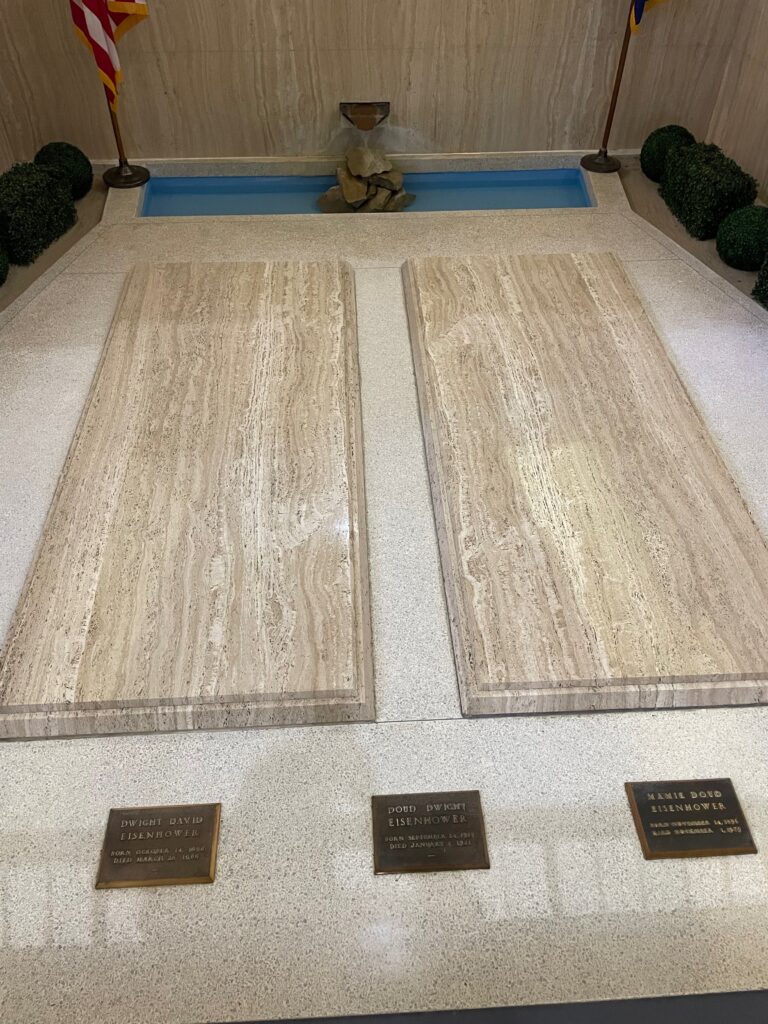Erik Visits an American Grave, Part 1,852
This is the grave of Dwight Eisenhower.


We don’t need a full biography of Eisenhower here, so let me make a few points about him and his presidency, primarily.
First, I suppose we should at least go over him as a general. As it turned out, he was pretty good at it. To me, this is the least interesting part of his career. That’s not to say the least important part because obviously, his abilities in Europe were absolutely critical. I am not trying to short this, it’s just that for a short post, I want to focus on the presidency. But I will say that unquestionably Eisenhower was a great choice for what he needed to do in World War II. His organizational abilities were excellent. The Allies were lucky to have him leading American forces in Europe.
Second, it’s worth noting just how tired Democrats were for ideas by 1952. The idea of Eisenhower as a Democrat never made much sense–he was obviously a conservative man. And I am not trying to be too too critical of midcentury Democrats here. After all, they had won 5 elections in a row and the difference in American society between 1932 and 1952 can not be overstated–outside of the end of the slavery, has any 20 year period in American history seen such a radical transformation? The nation was very much more conservative by 1952 than during the peak of the New Deal as well, at least in terms of electoral politics. After all, 20 years is a long time in power. But there really wasn’t anyone out there to carry on the FDR legacy in 1952 and that’s how, first, you have hopes among power players in the party that Eisenhower would run as a Democrat and then how you get someone as uninteresting as Adlai Stevenson to carry the party’s banner. That Stevenson was the nominee in 56 and even had real legs in 60 is a whole other issue. Of course, as a transplanted southerner, Eisenhower had been a Democrat for a time as an adult and still held most of those racial views, so the idea of him running in the party was not totally ridiculous. But that it was Truman himself trying to get Eisenhower to run as a Democrat particularly shows how poor the bench was at that time.
Third, from my perspective the Eisenhower presidential legacy cuts two ways. One is the frequent discussion from liberals of Eisenhower as the relatively good Republican. And look, he did not tear down the fundamentals of the New Deal state! He understood that the world of 1953 was not the world of 1930. That infuriated the Robert Taft wing of the party. It helped lead to the far right extremism that would later become the grassroots of the Republican Party and which we still live with today–and boy do we live with it!!! But sure, he would accept the existence of Social Security. He did not like unions but at least recognized they sort of had a place in a modern economy. He created the Department of Health, Education, and Welfare and supported the expansion of the welfare state, so long as it was a limited expansion. So great. I am certainly not going to criticize the Interstate Highway Act, though of course it did lead to the hollowing out of the cities. But there were lots of cultural reasons for that.
Fourth, outside of the fact that Eisenhower was not Robert Taft or Barry Goldwater, he was absolutely horrible on almost all policy issues. Much of this gets ignored because people don’t really care about the regulatory agencies. But on almost all of these, he overturned or stopped the advance of everything that he could in the 50s. It was Eisenhower who started the practice of putting right wing hacks on the National Labor Relations Board to use the power of the government to tip union battles to employers. His choice as Secretary of Agriculture was the utterly odious Ezra Taft Benson. Douglas McKay at Interior was equally awful, an absolutely dreadful choice. Not surprisingly, McKay and Eisenhower were all in on Termination, the latest genocidal activity against the Tribes. This was a blatant rip-off of the Tribes, convincing them to give up their tribal status in exchange for a small amount of money that stripped them of their land and resources and sent them to cities to live in poverty. Eisenhower’s record on Native issues is as bad as Andrew Jackson. I will also point out that while he had contempt for Richard Nixon, not dumping him as VP when he should have in 1952 laid the path for that bastard to become president. And of course, Eisenhower was happy to use Nixon and Joe McCarthy to his benefit so long as he personally was the beneficiary and the Army wasn’t attacked.
Fifth, there is the issue of foreign policy. So many of the worst crimes the United States ever committed in the world came during the Eisenhower years. Letting the Dulles brothers raise hell around the world based on the enormously large umbrella of whatever the U.S. needed to do to fight the Cold War was a disaster that the U.S. still lives with today. Guatemala is unstable today in no small part because the CIA overthrew Arbenz at the behest of United Fruit. We very much still deal with the consequences of the CIA coup against Mossadegh in Iran, which led to the Shah, which led to the Islamic Revolution and the problems we have with the Iranians. Americans rarely know their history with Iran but Iranians very much know their history with the United States. Eisenhower fell in love with the CIA coups and of course wanted the same thing to happen with Castro in Cuba, though under Kennedy, the Bay of Pigs was a disaster, as it would have been had it come to fruition under Eisenhower. And hey, cancelling the 1956 election to reunite Vietnam was a great idea and really worked out well for both the Vietnamese and the Americans! Obviously, the foreign policy of the Cold War is tremendously complicated and Eisenhower oversaw some of the most tense years of it, but the actions in the Global South really are utterly indefensible and reprehensible.
Sixth is race and civil rights. Eisenhower gets credit for nationalizing the Arkansas National Guard and forcing the integration of Little Rock schools. That’s fine on the surface. But Eisenhower hated everything about this. After Brown, a decision he strongly opposed because he frankly loved segregation, he stated privately that appointing Earl Warren to the Supreme Court was a huge mistake. But he was a law and order military man and a governor like Faubus flouting the federal government was simply an unacceptable situation, especially when troops were involved. And for as weak as the Ciivl Rights Act of 1957 was, Eisenhower did sign it. Again, like with much of Eisenhower, it’s a deeply mixed bag that looks better on the surface than it does in depth.
There is so, so much to say about Eisenhower and these years, but this post is already over 1300 words and I am going to leave the rest to comments. Eisenhower died in 1969 after many heart attacks. He was 78 years old.
Dwight Eisenhower (and Mamie too, talk about her all you want) is buried at the Dwight Eisenhower Presidential Library, Abilene, Kansas.
A story–when I went to the grave and of course the museum attached to the library–incredibly boring and deeply in need of renovation–I had to eat something. Abilene, also the home town of Bob Dole somehow, is not exactly filled with dining options. It was a Sunday afternoon, so it was even more sparse. I ended up at some kind of pub. On TV was not Fox. No, not those commies. Nope, they had OANN on. It was a great moment to consider the transformation of the Republican Party since Eisenhower.
If you would like this series to visit other presidents, you can donate to cover the required expenses here. Jimmy Carter is in Plains, Georgia and Ronald Reagan is in Simi Valley, California. Previous posts in this series are archived here and here.


